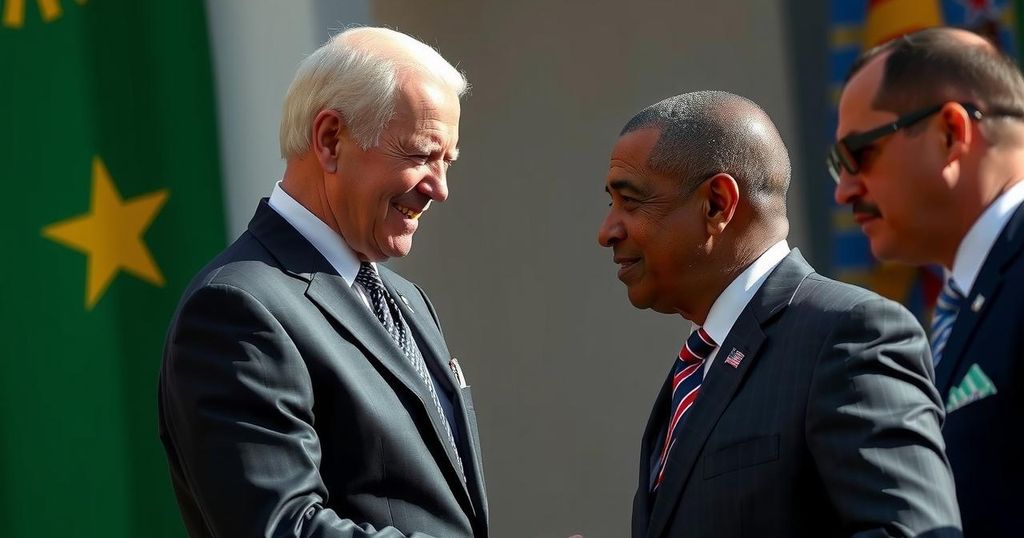Global news
AFRICA, ASIA, BIDEN, CAPE VERDE, CHINA, CONGO, DEMOCRATIC REPUBLIC OF CONGO, DEVELOPMENT, INTERNATIONAL RELATIONS, JOE BIDEN, LAR, MEXICO, NORTH AMERICA, TI, TR, TRADE, TRADE RELATIONS, TRAFIGURA, TRUMP, U. N. SECURITY COUNCIL, UNITED STATES, VECTURIS, WHITE HOUSE
Jamal Walker
0 Comments
Biden’s Strategic Visit to Angola: Strengthening U.S. Influence in Africa
President Biden’s upcoming trip to Angola emphasizes a U.S. effort to counter China’s dominance in African mineral resources through the Lobito Atlantic Railway. Funded by a $550 million U.S. loan, this project aims to facilitate the transportation of key minerals while strengthening U.S.-Angola relations—shifting from a contentious past to future cooperation. However, concerns about the project’s feasibility and competition remain amidst broader geopolitical tensions.
President Joe Biden embarks on a pivotal journey to Angola on Sunday, fulfilling his promise to visit Africa during his administration. This trip centers around a significant U.S.-backed railway initiative designed to reroute vital minerals away from Chinese interests. The railway project, primarily funded by a $550 million loan from the U.S. Development Finance Corporation, connects the mineral-rich Democratic Republic of Congo (DRC) and Zambia to Angola’s Lobito port, facilitating expedited exports to the West.
China has established itself as a dominant player in Congolese minerals, particularly copper and cobalt, essential for electronics and batteries. The U.S. seeks to counter China’s influence, particularly following a recent agreement made by China with Tanzania and Zambia to rejuvenate a competing railway to the east coast of Africa. Despite Biden’s engagement, it is anticipated that former President Donald Trump, upon returning to office, will continue to support the railway project and maintain relations with Angola.
Tibor Nagy, a former U.S. ambassador to Africa, emphasized that the Lobito Atlantic Railway addresses critical concerns regarding China and Russia’s growing presence in Africa, along with the U.S. need for access to these strategic minerals. This railway, backed by global entities such as Trafigura and Mota-Engil, is a significant step in advancing partnerships for economic growth. Biden’s visit will also include a brief stop in Cape Verde and a tour of Luanda’s slavery museum, highlighting a shift in U.S.-Angola relations from a historically contentious past.
Additionally, the Lobito rail project underscores the Biden administration’s broader pledge to enhance U.S. ties with Africa, though challenges and setbacks remain, including recent diplomatic losses in regions like Niger. Despite historical ties to China, Angola is eager to collaborate with various partners to stimulate its economy. As stated by Ricardo Viegas d’Abreu, Angola’s transport minister, “China has only gained prominence because Western countries have probably not been paying much attention to Africa.”
Underlining a complex history, the U.S. previously supported opposing sides during Angola’s civil conflict. Notably, former Zambian minister Akashambatwa Mbikusita-Lewanika expressed that financing the railway’s rehabilitation is a form of poetic justice for past actions that contributed to destruction in the region. Biden’s administration perceives the railway project as an emblematic effort to foster both public and private investment in Africa. Furthermore, enhancing U.S.-Angola relations in security cooperation is anticipated.
Critics have raised concerns about the project’s timeline and the feasibility of a further phase connecting to Tanzania’s east coast, potentially presenting competition to Chinese projects. Judd Devermont, a former Africa adviser to Biden, highlighted Congo’s desire to diversify its mineral partnerships, contending that enhanced connectivity across the continent is advantageous for all parties involved.
In recent years, Africa has gained strategic significance in global geopolitics, particularly concerning its abundant natural resources, such as copper and cobalt—crucial for modern technologies. U.S. interest in Africa is motivated by the desire to limit Chinese economic dominance on the continent, particularly in mineral-rich nations like the DRC. The establishment of critical projects, such as the Lobito Atlantic Railway, reflects evolving U.S. foreign policy aims and the necessity to strengthen relationships with African nations amidst growing competition from Russia and China.
In summary, President Biden’s imminent trip to Angola signifies a strategic move to reinforce U.S. influence in Africa through the Lobito Atlantic Railway initiative. This project aims to disrupt China’s substantial control over critical minerals by providing an efficient export route. Despite the complexities of U.S.-Africa relations, particularly given historical ties with China, the commitment to fostering partnerships signals a broader intent to enhance economic growth and cooperation in the region. Upcoming challenges and the prospect of a renewed Trump administration further complicate the narrative in a rapidly changing geopolitical landscape.
Original Source: www.usnews.com




Post Comment